

President Joe Biden announced on Thursday that the United States is ending “all American support for offensive operations in the war in Yemen” — but it remains unclear to what extent the end of U.S. support will actually affect conditions in the war-torn country.
Speaking at the State Department, Biden said the United States is also stopping “relevant arms sales.” White House National Security Advisor Jake Sullivan identified earlier in the day on Thursday two arms sales of precision guided munitions that were being halted.
While Biden’s supporters immediately praised his announcement — a move Congress failed to accomplish after passing legislation that was ultimately vetoed by then-President Donald Trump — the U.S. military has had relatively limited direct involvement in the conflict, which has become a wider war between Saudi Arabia and Iran, who is supporting Houthi rebels in Yemen.
The civil war in Yemen, which has been raging since 2015, has resulted in a devastating humanitarian crisis — including rampant cases of cholera and widespread famine — that has ravaged the poorest country in the Arabian peninsula. All the while, the United States has supported a Saudi-led coalition against the Houthi rebels, which the State Department designated as a terrorist organization just days before Biden assumed office.
Under the Trump administration, the U.S. government aggressively sold Saudi Arabia weapons such as smart bombs, which were then used in the Yemen conflict. An exclusive CNN report in 2018 laid bare the extent of the U.S.’ responsibility in the war, documenting instances where American-made bombs were found at the sites of strikes that either killed civilians or put them at risk.
In one instance a coalition strike hit a school bus in northern Yemen, killing dozens of children; the bomb found at the site was made by Lockheed Martin, according to CNN, and sold to Saudi Arabia as part of an arms deal with the U.S. State Department.
“The United States says it does not make targeting decisions for the coalition,” CNN reported. “But it does support its operations through billions of dollars in arms sales, the refueling of Saudi combat aircraft and some sharing of intelligence.”
The U.S. military practice of refueling Saudi aircraft was ended in 2018 by the Trump administration.
The Defense Department wasn’t immediately able to define what specific “offensive operations” would be halted on Thursday.
While briefing reporters earlier in the day, Sullivan clarified that the halt in support would not extend to actions against Al Qaeda in the Arabian Peninsula.
“It extends to the types of offensive operations that have perpetuated a civil war in Yemen that has led to a humanitarian crisis,” Sullivan said.
Biden later added that the U.S. would also continue supporting Saudi Arabia’s self-defense from “Iranian-supplied forces.”
“Saudi Arabia faces missile attacks, UAV strikes, and other threats from Iranian-supplied forces in multiple countries,” Biden said. “We’re going to continue to support and help Saudi Arabia defend its sovereignty and its territorial integrity and its people.”
Featured photo: President Joe Biden speaks about foreign policy, at the State Department, Thursday, Feb. 4, 2021. (AP Photo/Evan Vucci)
